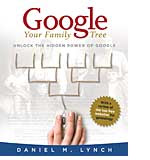Friday, April 16, 2010
On the Principle "Anything is Better than Nothing"
Isn't a "halfway" job better than none at all?
As genealogists, we come up against this philosophy in all sorts of ways. Its roots grow deep into the advice we always here: "We won't live long enough to complete the tracing of our family. So let's go ahead and publish what we have - lest we die and our work gets thrown out by unappreciative family members." I know that is one of my biggest fears.
There is logic to this statement, but its reality is filled with problems. Once our tree is in print, it becomes gospel for untold numbers of casual treeclimbers - and for trusting experts in other fields of study who are not familiar with genealogical research standards.
To be a responsible family history author requires patience in rushing to print our "story". We must instill in ourselves good work habits on a daily basis. Three things we need to do is:
1. Take careful notes and have thorough documentation - so that whatever you print is reliable.
2. Have sound judgement as to when you have done enough research.
3. Learn enough social, historical, economic, and legal background in order to evaluate your research findings.
To new or unknowing researchers it is easy to take published secondary records as truth. They will find an ancestors name in a book and that is the only one of that name listed in the book. Therefore he must be mine. Good genealogical journals, societies, professionals have spent years publishing corrections to undo the damage done by those who have used publications that were wrong to begin with and then jumped to wrong conclusions. I know I own a few of those books filled with many errors it can be very upsetting and even damaging to the work of future researchers who don't know to check the facts listed.
I want to publish my work for good posterity - not so future researchers can brand me incompetent. I abstract record collections such as census, wills, land records to help others who don't have the means to access them draw sound conclusions about the family history from the data I provide. I try my best to not mislead or confuse those who trust me and my research and writings.
In genealogy, as with everything else in life, the old saying applies: If a job's worth doing, it's worth doing well.
As genealogists, we come up against this philosophy in all sorts of ways. Its roots grow deep into the advice we always here: "We won't live long enough to complete the tracing of our family. So let's go ahead and publish what we have - lest we die and our work gets thrown out by unappreciative family members." I know that is one of my biggest fears.
There is logic to this statement, but its reality is filled with problems. Once our tree is in print, it becomes gospel for untold numbers of casual treeclimbers - and for trusting experts in other fields of study who are not familiar with genealogical research standards.
To be a responsible family history author requires patience in rushing to print our "story". We must instill in ourselves good work habits on a daily basis. Three things we need to do is:
1. Take careful notes and have thorough documentation - so that whatever you print is reliable.
2. Have sound judgement as to when you have done enough research.
3. Learn enough social, historical, economic, and legal background in order to evaluate your research findings.
To new or unknowing researchers it is easy to take published secondary records as truth. They will find an ancestors name in a book and that is the only one of that name listed in the book. Therefore he must be mine. Good genealogical journals, societies, professionals have spent years publishing corrections to undo the damage done by those who have used publications that were wrong to begin with and then jumped to wrong conclusions. I know I own a few of those books filled with many errors it can be very upsetting and even damaging to the work of future researchers who don't know to check the facts listed.
I want to publish my work for good posterity - not so future researchers can brand me incompetent. I abstract record collections such as census, wills, land records to help others who don't have the means to access them draw sound conclusions about the family history from the data I provide. I try my best to not mislead or confuse those who trust me and my research and writings.
In genealogy, as with everything else in life, the old saying applies: If a job's worth doing, it's worth doing well.
Subscribe to:
Post Comments (Atom)




Well said!
ReplyDelete